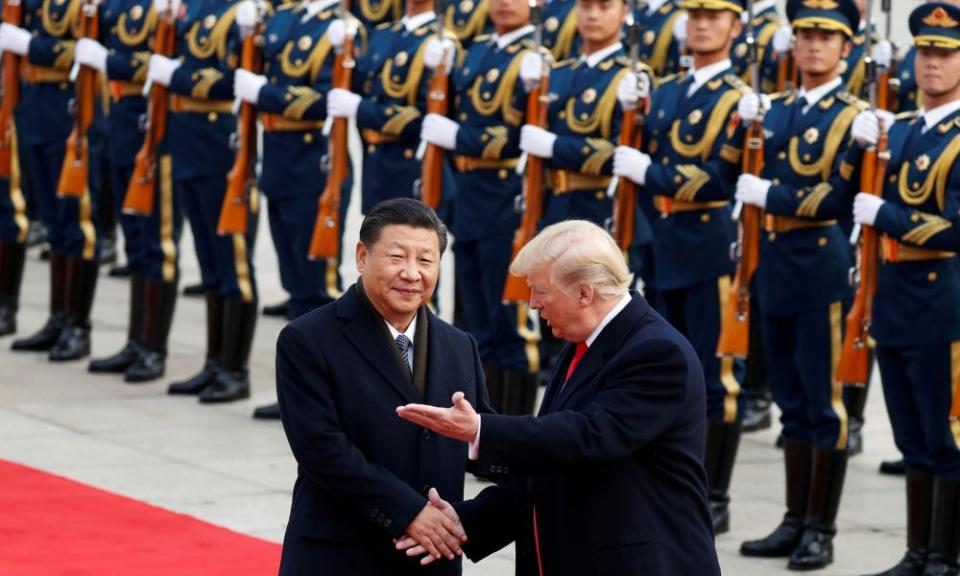‘I feel like a target’: US tech workers of Chinese descent see trade war backlash

Technology workers of Chinese descent say that they are experiencing backlash due to the US-China trade war and fears over Huawei, according to a survey commissioned by the Guardian through Blind, an app allowing anonymous workplace communication.
“With the trade war against China and especially the Huawei case I feel like a target more and more every day,” an anonymous Amazon employee wrote in a comment on the app, which is popular among technology employees and verifies employment through work emails. “I can’t even feel comfortable about being Chinese because so many Americans see China as a threat now.”
The Guardian asked Blind to commission the survey after the Trump administration escalated tensions in the growing trade dispute by declaring a national economic emergency and placing Huawei on a government blacklist.
The move had immediate consequences for Silicon Valley companies that do business with Huawei, which is the second-largest smartphone maker in the world after Samsung and ahead of Apple. Google blocked Huawei’s access to updates of the Android operating system and other US chipmakers cut off supplies to the company.
More than 6,000 Blind users responded to the question, “Do you predict that there will be negative consequences for people who are connected to China/perceived to be Chinese due to the growing tensions of the US-China trade war and concerns over Huawei?” Respondents were also asked if they were Chinese citizens, Chinese Americans, or of other East Asian ethnicities. The survey is not a scientific poll, but it does provide some insight into sentiments among tech workers who use the app to discuss workplace issues with anonymity.
Nearly two-thirds of respondents working for hardware or semiconductor firms responded “Yes” or “It’s already happening”. Employees of the chipmaker Qualcomm were the most concerned, with 20% saying individuals of Chinese descent were already facing negative consequences, and 56% predicting problems. Employees of Nvidia and Apple also had especially high rates of concern, followed by Google, Intel and Uber.
Slightly less than half (48.4%) of respondents working for software and internet companies either predicted problems or said they were already happening. Across all industries, Chinese nationals had the highest rates of concern (66.7%), while Chinese Americans and those of other East Asian ethnicities (approximately 48%) were slightly more concerned than those who said they were not Chinese or East Asian (43%).
“Asian Americans have always been haunted by the specter of dual loyalty, and it’s not just in our heads,” said Frank Wu, a University of California Hastings law professor and the author of Yellow: Race in America Beyond Black and White. “The best example is the internment of Japanese Americans in world war II. Two-thirds of those interned were native born … Every time there is tension between any Asian country and America, Asian Americans face problems, even if they’re not of that particular ethnicity.”
The Trump administration’s action against Huawei came amid increasingly bellicose rhetoric against China by US politicians and foreign policy figures. In November, the Hoover Institution released a report urging “constructive vigilance” against Chinese efforts to influence American society. The report’s authors warned against subjecting Chinese Americans to “the kind of generalized suspicion or stigmatization that could lead to racial profiling or a new era of McCarthyism”, but also argued that “the Chinese American community” was a target of influence efforts. The report has garnered criticism from dissenting experts who say it will lead to racial profiling.
In April, a group of former government officials and foreign policy figures revived the coldwar-era Committee on the Present Danger as a new organization with a focus on opposing China. At a launch event for the group, Steve Bannon, the former Trump adviser and far-right figurehead, railed against Huawei, saying: “Huawei is the People’s Liberation Army … 5G turns data into plutonium that can be weaponized and they intend to weaponize.”
Andy Li, a Chinese American college student and member of the Silicon Valley Chinese Association, said that he had noticed increased hostility toward Chinese students on campus, and that the climate was also raising concerns about job prospects for Asian Americans.
“There’s also this newer fear that for Asian Americans, and especially Chinese Americans, it’s going to be harder to get jobs, especially in tech, cybersecurity, and scientific research,” he said. “There’s this fear that even after you’ve assimilated and become a citizen, it doesn’t matter. You’re a national security threat.”
Other individuals who spoke to the Guardian were less concerned about increased hostilities. Patrick Ma, a software engineer with an American-born mother and Hong Kong-born father, said that he was happy to be a “global citizen” and that he hadn’t experienced any discrimination. “The Chinese have so much to be grateful for to Trump,” he said, because actions like the Huawei blacklist would force the company to launch its own operating system and improve China’s economy.
Juliet Shen, a Chinese American product manager at Snap, said that she did have concerns about racial profiling, but not for herself.
“My concerns are more for my parents, who are scientists, and there’s similar allegations of espionage, suspicion [and] discrimination towards Chinese scientists right now too,” she said. “It’s always been a little bit of a concern but definitely has ramped up in recent months [and] years. The Chinese academic and science community has been very panicked and afraid.”
